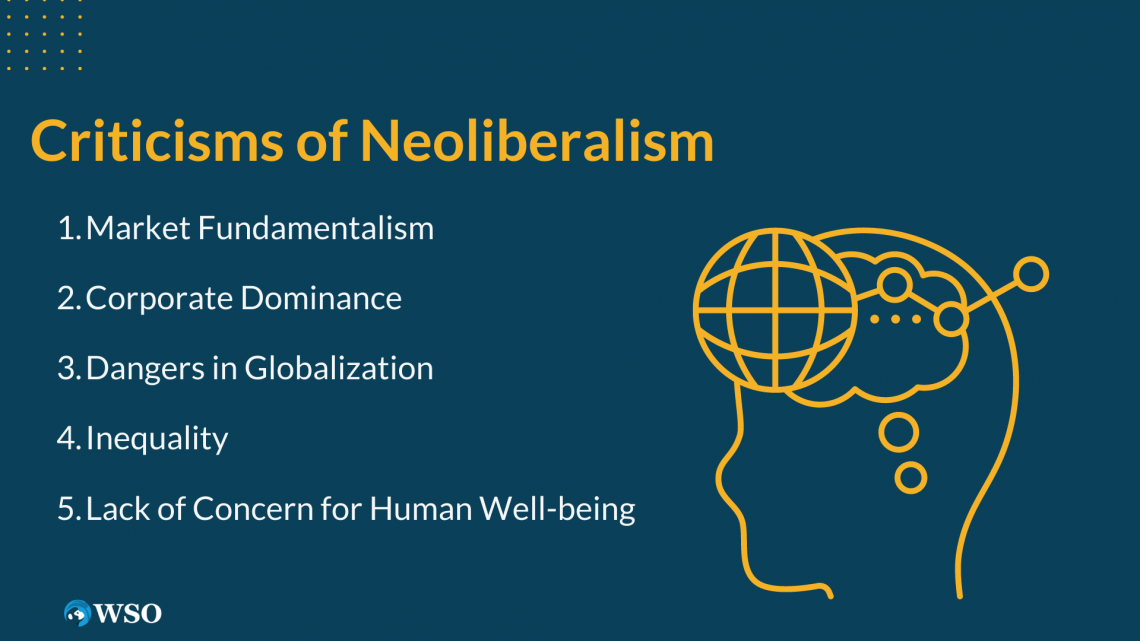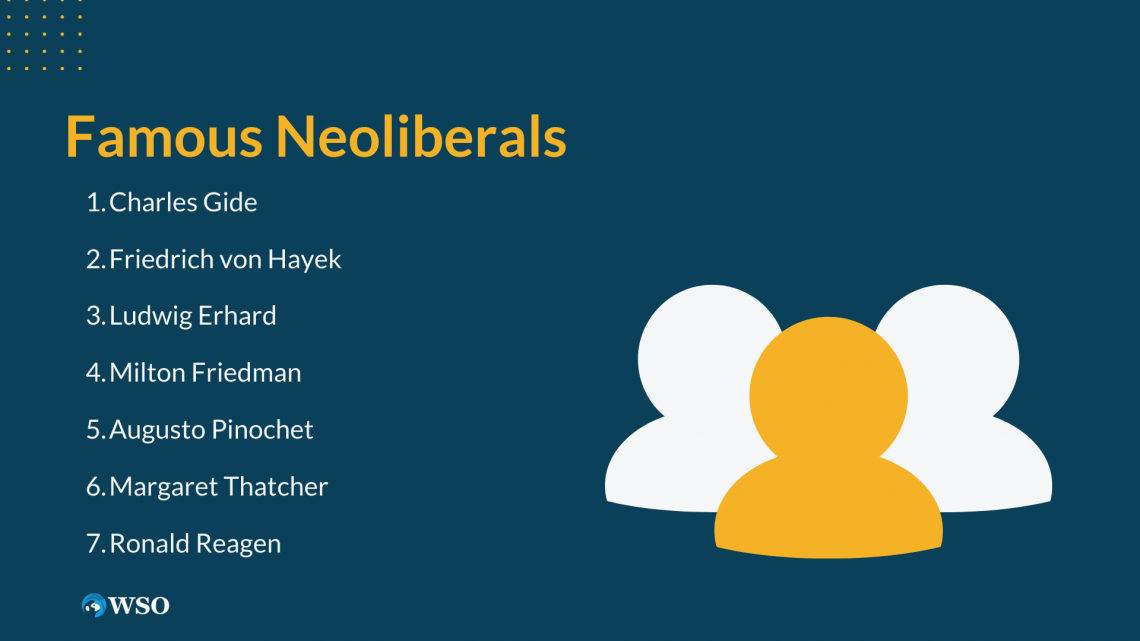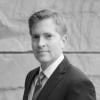Neoliberalism
Definition & Impact on the Economy
An economic philosophy known as neoliberalism aims to hand over power from the public to the private sector while emphasizing the merits of free market capitalism.

It is frequently associated with laissez-faire or "hands-off" economics, which also incorporates the principles of privatization, deregulation, globalization, and free trade.
The Keynesian period of capitalism, which lasted from 1945 to 1980, is seen to have been reversed 180 degrees by neoliberalism. Neoliberalism was created by a group of individuals, including Ludwig von Mises, Friedrich Hayek, and Walter Lippmann.
They emphasized "the priority of the price mechanism, free enterprise, the system of competition, and a strong and impartial state."
Ludwig von Mises and Friedrich Hayek, who were both exiled from Nazi-controlled Austria, saw social democracy, as exemplified by President Franklin D.

Roosevelt's heavily regulated New Deal programs in the United States and the rise of the welfare state in Great Britain after World War II as manifestations of collective ownership of production and wealth that were on the same socioeconomic scale as Nazism and communism.
Neoliberalism gained new backing in 1947 with the creation of the Mont Pelerin Society (MPS) after being mostly neglected during World War II.
Friedrich Hayek, Ludwig von Mises, Milton Friedman, and other well-known neoliberal economists, philosophers, and historians made up the MPS, which was devoted to spreading the principles of free markets, individual rights, and open society.
The society highlighted its concern about the growing "dangers to civilization" presented by the growing influence numerous governments worldwide held over their citizens in its inaugural mission statement.

The declaration was made as post-World War II politics and economics were being shaped by the development of communism in the countries of the Eastern Bloc in Central and Eastern Europe and the rise of socialism during the Great Depression in the democratic Western Bloc economies.
In 1944, Friedrich Hayek released "The Road to Serfdom," an article at the same time that First Lady Eleanor Roosevelt praised Joseph Stalin and Albert Einstein argued in favor of socialism.
Hayek passionately warned against the risks of government control over the means of production through the gradual suppression of individual rights and the rule of law in the well-referenced discourse.
Also, the chairman of Ronald Reagan's Council of Economic Advisers, Milton Friedman, was one of the 22 MPS members of the 76 economic advisers who served on his campaign staff in 1980.
Key Takeaways
- A political and economic philosophy known as neoliberalism aims to hand over power from the public to the private sector while emphasizing the merits of free market capitalism.
- It can be tempting to group neoliberalism with modern liberalism or social progressivism. Although these philosophies sprang from the same historical movements, their application in the present era has changed.
- Neoliberal political policies are most compatible with contemporary libertarian values while having the word "liberal" in their name.
- Libertarians extend the neoliberal goal of preventing market government intervention to social and political freedom.
- Our current understanding of neoliberalism is influenced by those who created, promoted, and implemented its ideas.
Neoliberalism Fundamental Concepts
It can be tempting to group neoliberalism with modern liberalism or social progressivism. Although these philosophies sprang from the same historical movements, their application in the present era has changed.

One's desire for a free market mostly unregulated by the government is primarily what neoliberalism means. In neoliberal views, terms like deregulation and free trade are frequently used. Particular economic principles include:
- No price restriction: This prevents the government from setting a ceiling on what items and services can be sold on the open market.
- Keeping federal and state taxes low: this will help the market remain more fluid by lowering marginal tax rates.
- Deregulating markets: this entails lessening the influence of the government on the free market by removing restrictions that impede economic expansion.
- Free trade: this means removing barriers to international trade, such as tariffs.
- Government debt: Getting rid of or cutting back on government spending will help keep the debt level low.
Neoliberal political policies are most compatible with contemporary libertarian values while having the word "liberal" in their name. Libertarians extend the neoliberal goal of preventing market government intervention to social and political freedom.

They frequently hold the opinion that totalitarianism can result from excessive government control of a community. Some political concepts include:
- Reducing the degree of control, the government has over how a private firm or venture runs is known as deregulating private industries.
- Reducing or abolishing public ownership to stop the government from having a stake in private property or businesses.
- Keeping a workforce while reducing the impact of labor unions on employers' ability to run their businesses without the help of organized unions.
Criticisms of Neoliberalism
Since the 2008–2009 global crisis, Neoliberalism has been under fire from both Democratic and Republican politicians and economists.

The following are some of the main objections against neoliberalism:
1. Market Fundamentalism
Neoliberalism's proponents claim that free market principles should not be used in particular sectors, such as healthcare and education, because these sectors provide public services that are not motivated by profit potential like traditional commercial and industrial markets.
2. Corporate Dominance
Neoliberalism has come under fire for advocating economic and political strategies that grant massive businesses almost monopolistic levels of control while transferring an excessive amount of production rewards to the upper class.
NOTE
Economists Jamie Peck and Adam Tickell have suggested that this effect permits unduly powerful firms to control the fundamental aspects of daily life rather than the people themselves.
3. Dangers in Globalization
The economists Lorna Fox and David O'Mahony blame the rise of the "precariat," a new global class of people forced to live precariously without any predictability or security.
According to political scientist Daniel Kinderman of Cornell University, as many as 120,000 extra fatalities occur yearly in the United States alone due to the precariat's desperate "life on the edge" existence.
4. Inequality
The claim that neoliberalism's policies promote economic inequality based on class and enable or even exacerbate global poverty may be the most often voiced criticism of the movement.
While those with low incomes experience a decline in their purchasing power, the wealthy experience financial growth and an increase in their inclination to save, preventing the riches from "trickle-down" to the underclasses as advocated by neoliberals.
For instance, economists David Howell and Mamadou Diallo have suggested that the United States distribution of wealth is highly uneven due to neoliberal policies.
NOTE
According to Howell and Diallo, since the late 1980s, neoliberal policies have led to the biggest income distribution inequality in American history, with the middle class being barely recognizable from the destitute.
5. Lack of Concern for Human Well-being
Neoliberalism has recently come under fire for fostering a lack of concern for the actual wellness of people.
This argument contends that by stressing privatization and ever-increasing profits, neoliberalism disincentivizes actions that would better the human situation but would reduce profits, which is related to criticisms of socio-economic inequality.
Neoliberalism, for instance, may disincentivize more ecologically conscious, costlier behaviors, resulting in a series of environmental crises (which, in turn, disproportionately affect the lower and working classes).
Additionally, it might encourage activities that boost profits even when they harm real people, like increasing the price of life-saving medication or equipment at a time when demand and need are at an all-time high.

Mexico's President López Obrador claimed in a six-page statement in May 2020 that the COVID-19 pandemic had shown that the neoliberal model is only interested in economic success "without caring about the wellbeing of the people."
López Obrador added that the "scant solidarity" between countries brought on by neoliberal policies had been highlighted by the widespread difficulty in acquiring pandemic-related medical equipment.
In his conclusion, the epidemic "has to show that the neoliberal model is in its terminal phase."
Famous Neoliberals
Our current understanding of neoliberalism is influenced by those who created, promoted, and implemented its ideas.

Numerous political and corporate figures from the 1900s played a crucial part in the development and growth of neoliberalism. These leaders include:
1. Charles Gide
The term "néo-libéralisme" was originally used by a French economist in 1898 to refer to the Pantaleoni-supported free market system. His support for a cooperative economy and society is outlined in his 1904 book Consumers' Co-operative Societies.
2. Friedrich von Hayek
One of the founding members of the Mont Pelerin Society in Switzerland in 1947. In The Road to Serfdom, published in 1943, he makes the case that centralized government expenditure invariably results in a totalitarian regime.
For his "incisive analysis of the interdependence of economic, social, and institutional phenomena," Hayek and other economists shared the 1974 Nobel Memorial Prize in Economic Sciences.
3. Ludwig Erhard
Ludwig is credited with establishing economic stability in West Germany following World War II.
Erhard's commitment to the social market economy inspired the revolutionary application of traditional liberal ideas, which still serve as the cornerstone of the German economy today.
4. Milton Friedman
He was an American economist who co-founded the Mont Pelerin Society. Neoliberalism was first mentioned in the context of 20th-century economics in Friedman's 1952 article "Neoliberalism and Its Prospects."
NOTE
For his contributions to stability theory and consumption economics, Friedman won the Nobel Prize in 1976.
5. Augusto Pinochet
He’s a late 20th-century Chilean politician and general who imposed economic reform with force. Pinochet cracked down on political rivals and labor unions, privatized several governmental agencies, and eliminated tariff safeguards.
Economic expansion, followed by Pinochet's expulsion and trial for theft, human rights violations, and tax evasion, were the results of these reforms.
6. Margaret Thatcher
She was the British prime minister from 1979 to 1990, whose political, social, and economic initiatives gave rise to the term "Thatcherism."
Thatcher responded to the heavily regulated British economy in place prior to her victory by cutting taxes and reducing government spending. Later prime leaders' policies well into the twenty-first century were affected by Thatcherism.
7. Ronald Reagen
He was the President of the United States in the 1980s, whose political and economic strategies included neoliberalism.
Reagan's "Reaganomics" economic strategy, which included lowering federal taxes and limiting inflation by shrinking the money supply, stressed the value of the deregulated free market.
Reviewed & Edited by Ankit Sinha | LinkedIn
Free Resources
To continue learning and advancing your career, check out these additional helpful WSO resources:




or Want to Sign up with your social account?